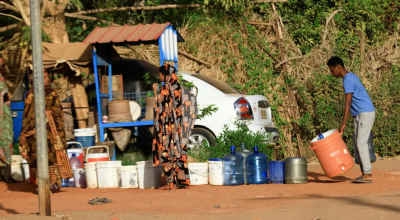A senior United Nations official announced today, Monday, that relief agencies are looking to introduce aid to Sudan via a new route from South Sudan due to difficulties faced in accessing many areas of the country after nine months of war that has resulted in a major humanitarian crisis. The ongoing conflict between the military and the Rapid Support Forces, a paramilitary group, has left nearly half of Sudan's 49 million people in need of assistance. More than 7.5 million people have fled their homes, making Sudan face the world's largest displacement crisis, in addition to rising hunger rates.
Aid supplies are being looted, and humanitarian workers are facing attacks, while international agencies and non-governmental organizations have long complained about bureaucratic obstacles preventing access to Port Sudan, which is controlled by the military, and obtaining permits to travel to other parts of the country. Rick Brennan, the emergency program director for the World Health Organization’s Eastern Mediterranean Regional Office, stated in a press conference in Cairo today, "The working environment there is extremely difficult."
Relief agencies can no longer access Wad Madani, which previously served as a center for aid, after the Rapid Support Forces took control of it from the military last month. Wad Madani is located in the agricultural Gezira state southeast of Khartoum. The advance of the Rapid Support Forces into the Gezira and the recent fighting in South Kordofan state between the military and the paramilitary forces and the Sudan People's Liberation Movement-North has led to a new wave of displacement.
The UN and other agencies are now only allowed to operate outside Port Sudan on the Red Sea coast, as well as deliver aid from Chad to the western Darfur region, where ethnic killings are occurring. Brennan said, "We are also looking to initiate operations across the border from South Sudan to the southern parts of the Kordofan states in Sudan."
### Disease Outbreaks
The deterioration of health services escalated when the war broke out in mid-April. Brennan noted, "We have at least six major diseases spreading, including cholera... We have also witnessed outbreaks of measles, dengue fever, vaccine-derived polio, malaria, and more. Hunger levels are also rising due to the inability to access food."
Diplomats and relief workers say the military and allied officials are obstructing humanitarian aid while both sides continue their military campaigns. Activists report that neighborhood volunteers are being targeted. They added that the Rapid Support Forces make little effort to protect aid workers and supplies and are involved in looting. Both sides deny obstructing aid.
The military and the Rapid Support Forces shared power with civilians after a popular uprising in 2019 and then executed a coup together in 2021 before disputes arose between them regarding their positions in the transition leading to elections. UN humanitarian coordinator Martin Griffiths stated in a statement last week that the reasons for the lack of aid access are "truly disgraceful." He added that the customs clearance for supplies coming into the country could take up to 18 days and may take longer with additional inspections under military supervision.




